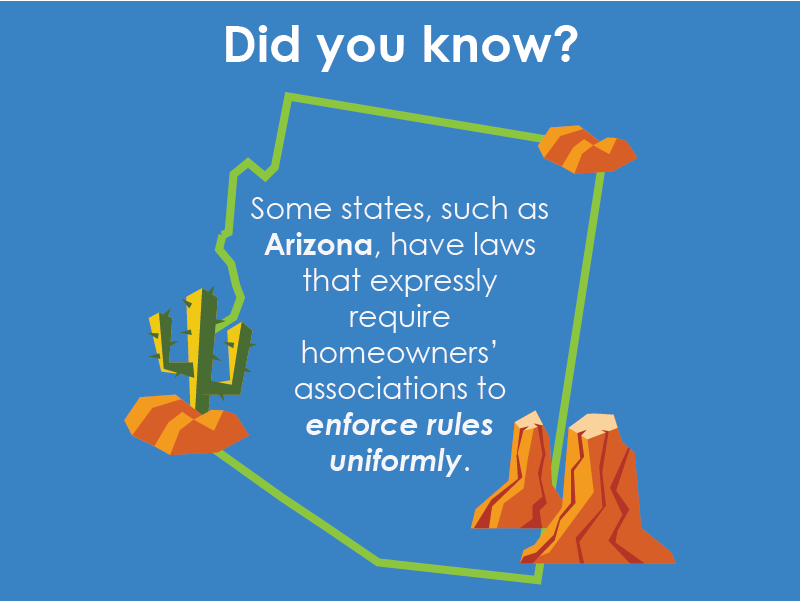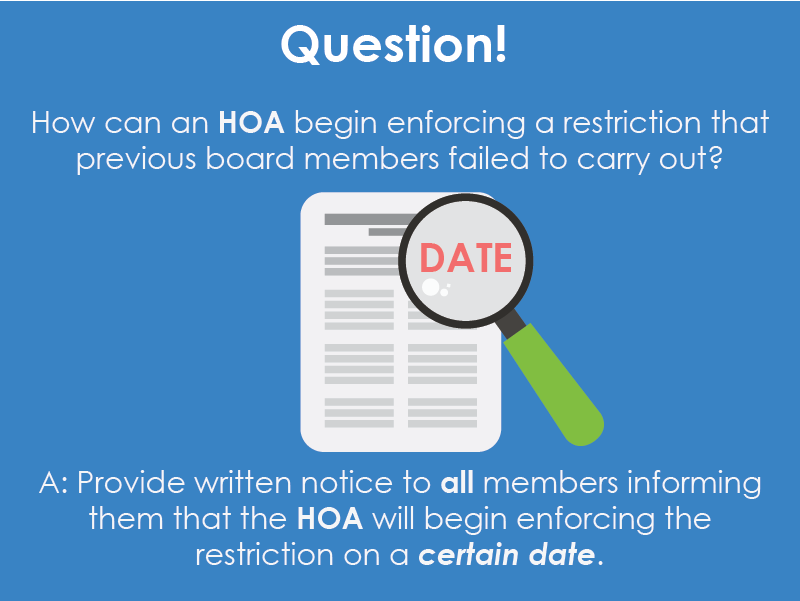The rules and bylaws of an HOA are designed to maintain the value and aesthetics of the development, keep owners safe, and preserve peace and happiness in the neighborhood.
HOA members already know that their community’s governing documents contain specific rules about what owners can and cannot do. Rules will dictate where trash bins can be stored, what types of pets you can own, and whether you can run an independent business out of your home.
All members of the association are obliged to follow the rules and bylaws. The association, and more specifically, the board, also has an obligation to enforce those rules. However, when rules are not regularly enforced, it can create conflict for the entire community.
What is selective enforcement?
Selective enforcement is when a homeowners association enforces a rule against some, but not all homeowners. If, for example, five people bought chickens and kept them in their backyards, but only two of those owners received a formal violation letter, this would be selective enforcement. Similarly, enforcing some but not all rules laid out in the governing documents is another form of selective enforcement.
Selective enforcement is a common issue in HOAs. It’s important for the board to try and correct this issue if it comes up as it can lead to legal battles and unnecessary expenses. In some states, a selective enforcement defense has been successfully used by homeowners, making it even harder for the board to get others to follow some rules.
Why do HOAs enforce rules selectively?
Associations may engage in selective enforcement without even realizing it. If the association’s board of directors only enforces rules when a violation is reported–as opposed to having someone perform routine inspections of the community–then enforcement patterns will largely depend on whether the people in the association regularly report violations. If there are only one or two people who notify the board when a rule is broken, then it’s much less likely that all rules will be fairly and routinely enforced. Owners may not even realize that rules are not being enforced evenly until they are reprimanded for breaking one, and find out that someone did the same thing without suffering consequences.
Sometimes, new board members may feel that the previous board was too lax about rule enforcement, and make more of an effort to fulfill their duties and obligations. While the new board would be doing the right thing, owners may question why they are only now getting in trouble for doing something that they’ve been doing for years.
Similarly, there may be a sudden increase in a certain type of violation, and the board may misguidedly try to set an example by issuing more severe penalties than they should to one or more owners. Whatever the cause, the result is the same. So, what should boards do if they find themselves in this situation?
Avoiding selective rule enforcement
As mentioned earlier, HOAs have an obligation to enforce the rules consistently and fairly. This is done for the good of the community as a whole. Some states, such as Arizona, actually have laws that expressly require HOAs to enforce the rules uniformly.

If that law doesn’t exist in your state, uniform rule enforcement is almost certainly included in your governing documents. In the eyes of the law, if an HOA is inconsistent in its enforcement of a certain rule, it may have waived its right to enforce that rule in the future (but establishing such a waiver is not easy).
There are some steps that HOAs can take to avoid inconsistent rule enforcement:
1. Discourage rule-breaking through education
Selective rule enforcement won’t become a problem if most owners don’t break the rules in the first place. The association should do all that it can to make sure everyone has access to the governing documents and that everyone understands them. Documents can be shared on a digital file-sharing platform or community website so that owners always have access to the latest version.
Be sure to educate new owners about the rules. Send out regular reminders about some of the most common violations to help members maintain compliance. Consider including a hard copy or link to the HOA’s CC&Rs in a welcome package as well. If the resources are available, the board could also host a formal class or training program for new members.
2. Follow the association’s enforcement process
Just as every HOA has its own rules and bylaws, each one has its own rule enforcement process. The steps that the association is required to take will depend on the community and the state laws. Many HOAs will send out a couple of warning letters, followed by a formal violation notice. If, after a certain amount of time, the issue has not been resolved, the association may issue monetary fines, revoke owner rights, etc.
It is crucial that the association follow the process laid out in the governing documents exactly. This goes beyond helping to ensure all issues are handled fairly and uniformly; if the issue ends up in court, the HOA will have a stronger case because it can demonstrate that it took the correct actions when trying to remedy the situation.
3. Document everything
Document any reports, complaints, evidence, etc., from homeowners. Furthermore, document what steps were taken after the issue was brought to the property manager, board or other staff members. Keep records of any notices/letters that are sent out, as well as any actions taken by the owner and association. There should be a paper trail demonstrating that proper procedures were followed.
4. Have someone watch for violations
If rule enforcement is problematic because most violations within the community aren’t being noticed, it may be a smart move to hire help. There are property management companies that specialize in rule enforcement. A manager will come onsite and check the entire property for violations. Since the property manager isn’t a member of the community and hasn’t built personal relationships with owners, it may be easier for them to issue violations and resolve issues objectively.
What to do when the previous board failed to enforce rules?
If you are part of a new board that is motivated to enforce rules in a way that the previous board failed to do, you may encounter some strong reactions from disgruntled owners. After all, no one said anything about their yellow porch or playground set before. Due to a board’s failure to act, a newly elected board attempting to enforce the association’s bylaws may find itself having to respond to selective enforcement defenses (more on this below) or blatant refusal to follow the rules.
One way for the association to navigate this issue is to provide written notice to all members. Inform them that the association will begin enforcing the rule starting on a certain date (for example, one month from the day the letter was written). By doing this, the board provides members with fair notice so that owners won’t be caught off guard when the rule is enforced.

If the restriction involves a permanent or semi-permanent matter (an owner already has five dogs at home but the limit for pets was three), then prior violators may need to be grandfathered in as the selective enforcement defense may apply to them. However, once proper notice is provided to all owners, the HOA may rightfully enforce the restriction against future violators.
Selective enforcement defense
Selective enforcement defense allows homeowners to sue their HOA for inconsistent rules enforcement. This defense is common in Florida, where selective enforcement is prohibited by law. When an HOA or condo association breaches its duty to fairly and consistently enforce rules, the owner is entitled to the defense against the board.
Because of the high volume of HOA disputes, the Florida Legislature has created an arbitration requirement. Owners must take this route before bringing their case to court. Furthermore, the unsuccessful party may be responsible for covering all of the attorney’s fees (including the cost of the arbitration). Owners are advised to speak with an attorney about their case before entering into arbitration, since the legal costs can be as much as $10,000.
If that wasn’t enough, under Florida law, many civil lawsuits are referred to mediation by a judge in order to see if the parties can settle the dispute without litigation.
If, after all of that, the owner and HOA are still unable to resolve the dispute, a Florida judge will hear each side and make a decision on whether or not the HOA selectively enforced a rule.
HOAs are not left defenseless against this claim. If an owner brings a lawsuit against the HOA for selective enforcement, but has clearly broken a rule, such as installing a pool in their backyard without approval from the association, then the HOA may be able to file a countersuit to compel the owner to comply with the CC&Rs. If the owner loses, they may also be ordered to compensate the HOA for its legal expenses.
Owners who feel that they are victims of selective enforcement are encouraged to draft a letter to the HOA and outline the alleged violation, along with any evidence to support their argument, before escalating the matter. Owners should indicate:
- If they are not guilty of the violation;
- If the board is selectively enforcing CC&Rs by allowing other owners to commit the same violation; or
- If they want to request a hearing to discuss the alleged violation with the board.
Conclusion
Rules and bylaws must be enforced in every HOA. The rules help keep the community safe and keep property values high. Plus, without consistent rule enforcement, owners would be a lot less inclined to follow them.
As such, boards must be careful not to enforce rules selectively. Uneven enforcement distorts expectations and makes it harder for future boards to fulfill their obligations. Follow the enforcement process prescribed by your governing documents and be as fair and objective as possible when issuing violations.























